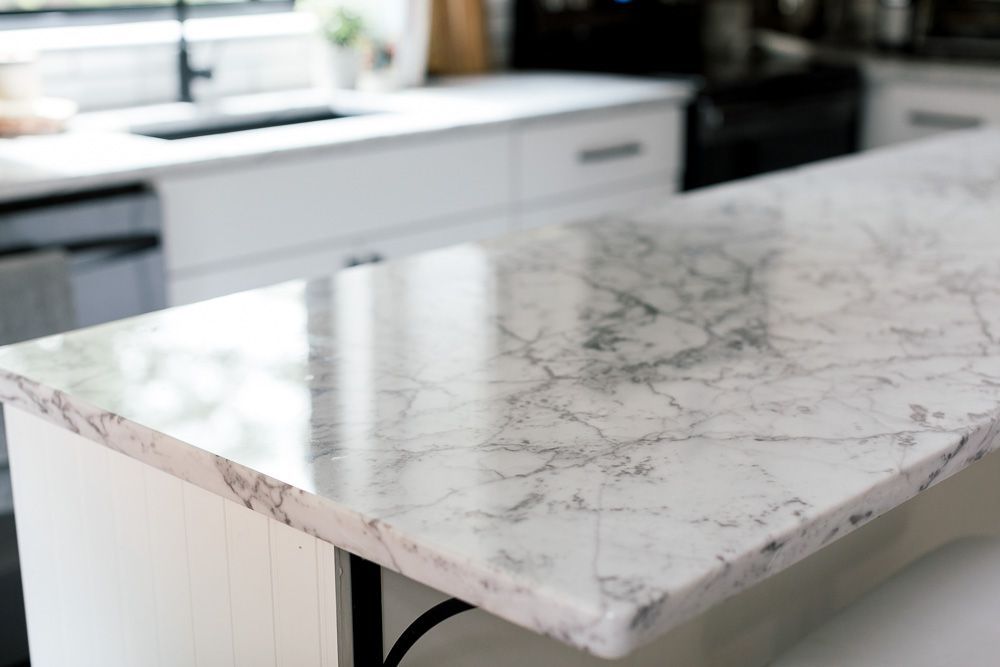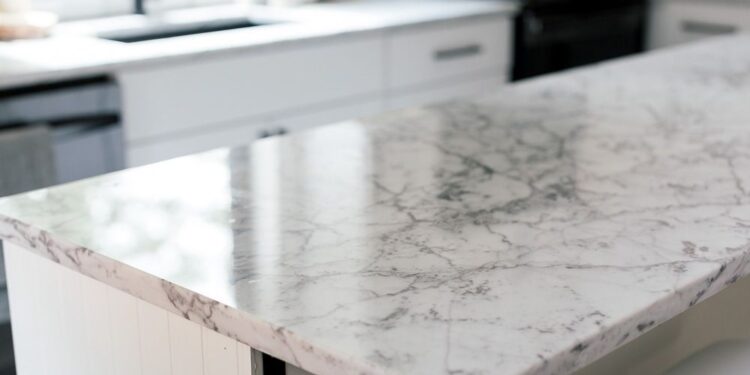A kitchen countertop’s color, design and material contribute significantly to its look and functionality. These qualities even impact a home’s resale value. Your cooking surfaces can consist of various materials, each with unique characteristics, benefits and drawbacks. But with so many options available, it can be overwhelming to pick one. Here is an in-depth look at various kitchen countertops to help you find your perfect match.
How to Choose the Best Kitchen Countertop
Consider the following factors to choose the best countertop for your kitchen.
Prioritize Durability and Maintenance
Quartz and granite are excellent choices if you want a surface that stands up to heavy daily use with minimal upkeep. Low-porosity materials such as quartzite, soapstone and well-sealed granite are most suitable for high-use kitchens since they resist moisture and stains better than porous alternatives like soapstone. Heat-resistant materials like granite, soapstone and marble are ideal if you frequently place hot pots and pans on your counter.
Before making a final decision, obtain samples of your top choices. Test them by exposing them to everyday kitchen hazards like spills, heat and sharp objects to see how they hold up.
Consider Your Lifestyle and Daily Use
Think about how and when you use your kitchen. Do you cook daily, or only on special occasions? Do you need something low-maintenance, or are you willing to put in a little extra care for a stunning surface? Answer these questions to narrow your options.
Let your lifestyle be your guide, especially when choosing grout colours. For a busy kitchen, a dark or matching grout shade offers practicality and hides stains. If maintenance is less of a concern, a light can define each tile for a dramatic effect.
Think About Your Budget
While granite, quartz and marble are on the pricier side, laminate and butcher block are more affordable alternatives. Installation costs also vary, so factor in labor and maintenance expenses.
Match Your Aesthetic Preferences
Your countertop should complement your kitchen’s style. Quartz or concrete might be the best choice if you’re into sleek, modern looks, while granite and marble can create a classic, timeless kitchen. Butcher block works beautifully in farmhouse or rustic designs.
Consider Eco-Friendly Options
For a more sustainable kitchen, opt for recycled, heat-resistant materials like granite, soapstone, marble, reclaimed wood or eco-friendly composites. Their longevity and ethical production make them an environmentally conscious choice.
Factor in Resale Value
Investing in high-quality countertops can increase your home’s asking price when you put it on the market. Buyers often prefer kitchens that contribute aesthetics, functionality and appeal.
Installation Requirements
Proper installation is nonnegotiable for a beautiful finish and to promote your counters’ longevity. Feel free to DIY if you’re handy, have the tools and are familiar with the specific countertop material you’re working on. Otherwise, hire a reputable professional to ensure a flawless and timely finish.
1. Granite — The Timeless Classic
Granite remains one of the most sought-after materials for kitchen countertops. Each slab offers unique patterns and colorations, making every granite countertop a one-of-a-kind addition to your kitchen. While it commands a premium price point, granite’s ability to withstand heat and daily wear makes it a worthwhile investment for many homeowners.
Pros
- Exceptional durability and longevity.
- Natural heat and scratch resistance.
- Unique patterns in every slab.
- Significant boost to home value.
Cons
- Requires periodic maintenance and sealing.
- Premium pricing.
- Potential for chipping under heavy impact.
- Limited repair options if damaged.
Maintenance: Regular cleaning with mild soap and water is a best practice. Seal granite every one to two years to maintain its stain-resistant character.
Best for: Homeowners who want a luxurious, long-lasting countertop with durable, natural stone appeal.

2. Quartz — The Modern Contender
Quartz countertops are the perfect blend of aesthetics and functionality. Manufacturers engineer them by binding quartz particles with resin, giving them nonporous attributes that make them particularly appealing for upholding food safety. The manufacturing process allows for consistent patterns and colors, making it easier to match your desired aesthetic.
Pros
- Nonporous, bacteria-resistant surface.
- Consistent coloring and patterns.
- Exceptional durability.
- Minimal maintenance requirements.
Cons
- Higher price point than many alternatives.
- Less heat resistant than natural stone.
- Professional installation is necessary due to the weight.
- Limited repair options.
Maintenance: Wipe with a damp cloth and mild detergent. Avoid harsh chemicals and excessive heat exposure.
Best for: Those seeking a sophisticated, low-maintenance, highly durable countertop option.
3. Marble — The Elegant Choice
Marble countertops have graced kitchens for centuries, bringing an unmistakable luxury through their distinctive veining patterns. This natural stone appeals to baking enthusiasts, as its consistently cool surface is ideal for working with pastry. However, its beauty comes with specific care requirements that homeowners should carefully consider.
Pros
- Distinctive, classy appearance.
- Naturally cool surface ideal for baking.
- Excellent heat resistance.
- Unique veining in every slab.
Cons
- High susceptibility to staining.
- Requires frequent sealing.
- Easily scratched and etched.
- Significant maintenance needs.
Maintenance: Clean spills immediately to prevent staining. Regular sealing is necessary to maintain its look.
Best for: Homeowners who prioritize aesthetic appeal and are willing to invest in maintenance.
4. Solid-Surface Countertops — The Practical Solution
Solid-surface countertops consist of a blend of acrylic and polyester materials. Their seamless appearance creates a clean, modern aesthetic that works well in contemporary kitchens. Easy repairs set these countertops apart — owners can buff or sand out minor damage, significantly extending their counters’ life span.
Pros
- Seamless appearance with no visible joints.
- Easily repairable surface.
- Nonporous and hygienic.
- Wide range of color options.
Cons
- Limited heat resistance.
- Vulnerable to sharp objects.
- Shows wear over time.
- It is less prestigious than natural stone.
Maintenance: Use a mild cleaner and a non-abrasive cloth. Remove minor scratches with sanding.
Best for: Those seeking an affordable, easy-to-maintain and modern-looking surface.
5. Laminate — The Budget-Friendly Option
Laminate countertops have evolved dramatically from their mid-century origins. Today’s options feature improved durability and sophisticated designs that convincingly mimic natural materials. This plastic-coated synthetic material offers incredible design flexibility at a fraction of the cost of stone alternatives.
Pros
- The most affordable countertop option.
- Extensive design and color selection.
- Easy installation process.
- Minimal maintenance requirements.
Cons
- Poor heat resistance.
- Prone to scratching and chipping.
- Damage is irreparable.
- May reduce home resale value.
Maintenance: Clean with mild soap and water. Avoid using sharp objects and excessive heat.
Best for: Budget-conscious homeowners who want various design choices.
6. Concrete — The Customizable Canvas
Concrete countertops represent the perfect fusion of industrial charm and personal expression. Each installation is uniquely customizable with different colors, textures and even embedded objects. Concrete opens possibilities for personalized kitchen designs that aren’t achievable with other materials.
Pros
- Unlimited customization options.
- Exceptional durability.
- Excellent heat resistance.
- Ability to include unique inlays.
Cons
- Requires professional installation and routine re-sealing.
- Potential for cracking.
- Significant weight concerns.
Maintenance: Regular sealing is necessary to prevent stains. Use a pH-neutral cleaner for cleaning.
Best for: Those who want a unique, customizable countertop with an industrial appeal.
7. Butcher Block — The Warm Welcome
Butcher block countertops bring warmth and functionality to any kitchen. Crafted from various wood species, these surfaces have practical and aesthetic benefits. You can refinish them multiple times, maintaining their beauty for decades.
Pros
- Natural attractiveness.
- Ideal for food preparation.
- Environmentally sustainable.
Cons
- Requires frequent maintenance.
- Vulnerable to water damage.
- Can harbor bacteria if not properly sealed.
- Shows knife marks and scratches.
Maintenance: Apply mineral oil regularly to prevent drying and cracking. Clean with mild soap and water.
Best for: Homeowners who prefer a warm, natural and functional food prep surface.
8. Stainless Steel — The Professional Choice
Stainless steel countertops offer unmatched cleanliness and durability in professional kitchens worldwide, so why not bring them into your home? Their seamless construction eliminates hiding spots for bacteria, while their heat resistance makes them ideal for serious chefs. The industrial aesthetic works particularly well in modern kitchen designs.
Pros
- Maximum hygiene and cleanliness.
- Outstanding heat resistance.
- Virtually indestructible.
- Professional appearance.
Cons
- Readily shows fingerprints and scratches.
- Can be noisy.
- Limited aesthetic appeal due to their sterile look.
- Higher cost than many alternatives.
Maintenance: Wipe with a soft cloth and mild cleaner to prevent water spots and fingerprints.
Best for: Those seeking a professional, industrial and low-maintenance kitchen workspace.
9. Soapstone — The Timeless Beauty
Soapstone offers a unique alternative to traditional stone countertops. Its natural darkening process creates a beautiful patina that many homeowners cherish. Unlike many natural stones, soapstone’s nonporous nature eliminates the need for sealing, though regular oiling enhances its innate beauty.
Pros
- Develops a stunning natural patina.
- Nonporous, heat- and chemical-resistant surface.
Cons
- Limited color options.
- Softer than other stone options.
- Requires regular oiling.
- More expensive than synthetic options.
Maintenance: Periodic oiling enhances its natural aging process. Avoid cutting directly on the surface.
Best for: Those who appreciate a unique, evolving countertop with minimal maintenance needs.
10. Recycled Glass — The Eco-Conscious Choice
Recycled glass countertops transform waste into stunning kitchen surfaces. These environmentally friendly options combine crushed glass with either cement or resin binders to create unique, sparkly surfaces. The result is sustainable and visually striking.
Pros
- Eco-friendly.
- Unique aesthetic appeal.
- Highly durable surface.
- Wide range of color options.
Cons
- Higher price point.
- Limited availability.
- Potential for chipping.
- Varying quality among manufacturers.
Maintenance: Clean with a non-abrasive cloth and mild soap. You may need to seal your counters, depending on the resin or cement composition.
Best for: Eco-conscious homeowners who want a modern and colorful kitchen surface.
11. Tile — The Versatile Classic
Tile countertops offer incredible design flexibility at a reasonable price point. Whether using ceramic, porcelain or natural stone tiles, this option allows for creative patterns and color combinations. Modern installation techniques and materials have eliminated many traditional concerns about tile surfaces.
Pros
- Highly customizable design options.
- Easy to replace damaged sections.
- Heat resistant.
- Budget-friendly.
Cons
- Grout lines require regular cleaning.
- The uneven surface can be impractical.
- Individual tiles may crack or chip.
- Dated appearance in some contexts.
Maintenance: Regularly clean grout lines to prevent staining. Use a tile sealer to enhance longevity.
Best for: Those looking for a cost-effective, customizable and heat-resistant surface.
Making Your Decision
Whether you prefer natural stone, engineered surfaces or reclaimed wood, there’s a perfect option to match your needs. Consider the pros and cons of each material to make an informed choice that elevates your kitchen’s appearance while providing years of reliable service.












